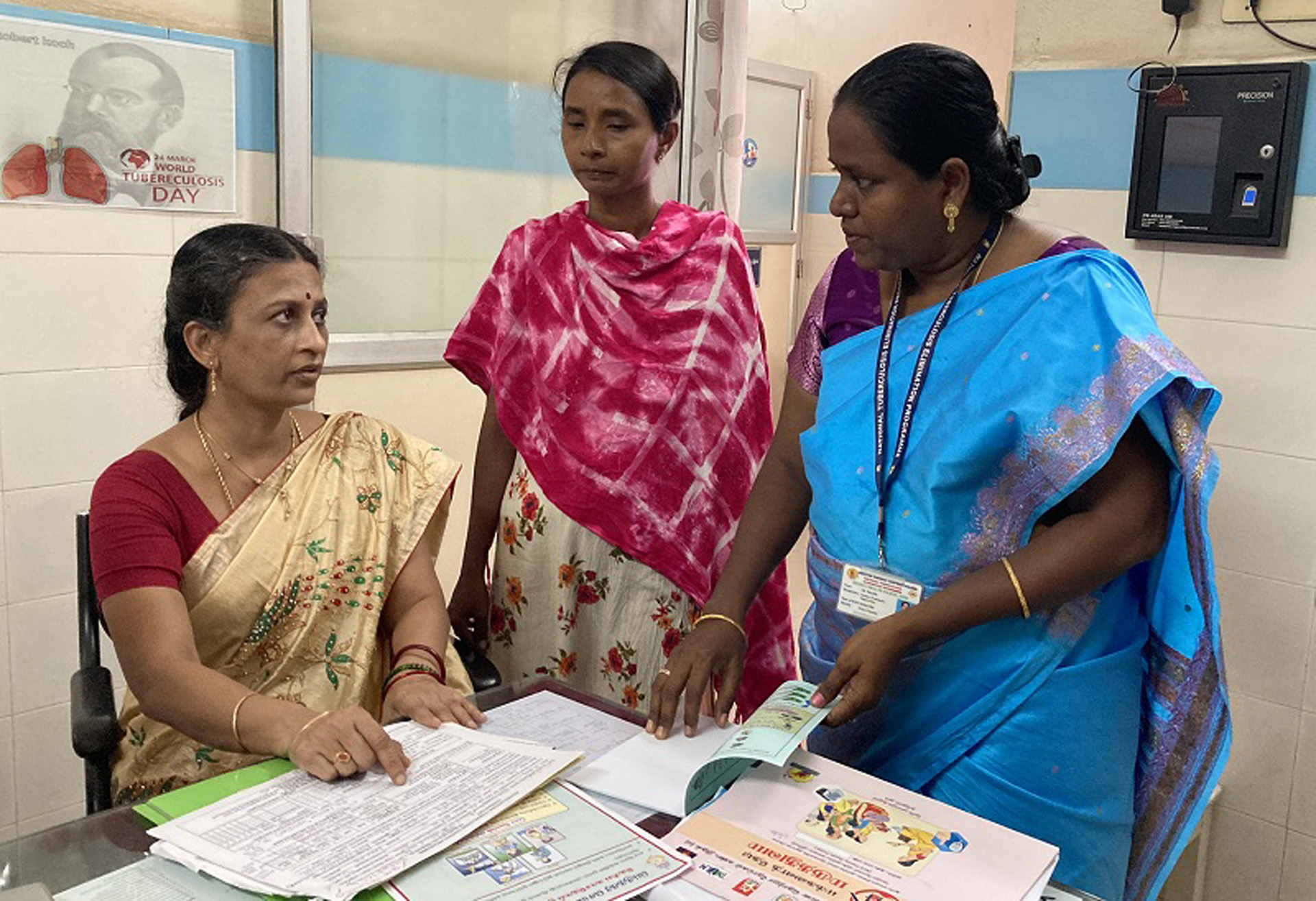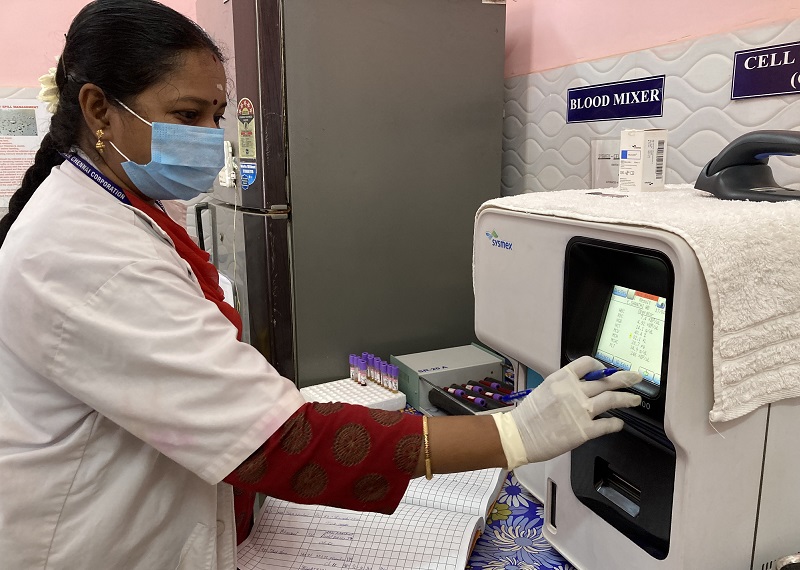Ms L. Ranjitha and her brother Mr L. Mugilan live in one room with their mother in an urban settlement in Chennai, Tamil Nadu. Their mother has active tuberculosis (TB), which is highly infectious when left untreated, but the siblings are healthy and tuberculosis (TB)-free because they received TB preventive treatment (TPT) within a week of their mother getting diagnosed on 9 November 2022. Their mother is currently on a six-months treatment for uncomplicated TB.
“Amma (mother) has never missed a dose and now eats her meals regularly. Her incessant coughing has stopped, she has gained weight and is back to work,” said Ms Ranjitha, who was provided TPT at Kodungaiyur Urban Primary Health Centre (UPHC) in Chennai. Since their mother works as housekeeper at a working women’s hostel in Chennai, close contacts at her workplace were also screened for TB.

Ms L. Ranjitha and her brother Mr L. Mugilan with Ms E. Latha at Kodungaiyur Urban Primary Health Centre (UPHC) in Chennai, Tamil Nadu (Photo: Sanchita Sharma/© WHO India)
“TPT is provided to all close contacts of TB patients, people with weakened immunity, and others at risk of infection to eliminate TB bacteria from the body before it causes active disease. Contact tracing of all newly diagnosed patients is done meticulously to give TPT to people who have been exposed to infection. Monthly follow-ups of patients are done to ensure all patients complete their full course of treatment and are cured,” said Dr Lavanya J., District TB Officer, Greater Chennai Corporation, which is leading Chennai TB Free Project under which comprehensive TB services are provided free at all 140 UPHCs in the Greater Chennai area.
Chennai TB Free Project focuses on active case-finding, screening, diagnosis, treatment and care and community outreach initiatives to protect the community and eliminate TB. In Chennai, as in the rest of India, all TB-related services are provided free to everyone who needs them at all government and identified private and NGO health facilities.

Dr Lavanya J., District TB Officer, Greater Chennai Corporation, with ASHA Ms S. Ezhilarasi and senior treatment supervisor Ms M Shanthi (Photo: Sanchita Sharma/© WHO India)
“An important aspect of elimination is active case-finding through chest x-ray and this is being offered to the community through Mobile Diagnostic Units (MDU). Digital x-ray machines have been installed in seven traveller vehicles, which is a first of its kind initiative in the country. These vehicles are staffed with a radiographer and a driver and are placed in slum areas, workplaces, old-age homes etc, to make it easy for people to get chest x-rays. We started implementing it in April 2018 to screen vulnerable populations at their doorstep. This initiative proved to be very beneficial for the community, as people who could not visit health facilities and government hospitals during working hours could visit these vehicles for x-rays near their homes or place of work. In 2019, we began using AI (artificial intelligence) for x-ray analysis, and now results are ready within a day, down from four days when we started,” said Dr Lavanya.

Under Chennai TB Free Project, ‘Mobile Diagnostic Units’ installed with AI-powered digital x-ray machines take TB diagnostics to the community and provide results within a day (Photo: Sanchita Sharma/© WHO India)
“Community outreach initiatives such as mobile vans – which provide digital x-ray services while simultaneously raising awareness about symptoms and available services – have built trust and helped to lower ‘lost to follow-up’ patients and increased treatment adherence,” said Dr Deepak R, medical officer at Thiru. Vi. Ka Nagar UPHC, which is one of 140 UHCs under Greater Chennai Corporation that offer TB services along with general OPD, noncommunicable diseases, malaria, reproductive and child health services, among others.
TB, which is infectious disease that most often affects the lungs, is preventable and curable. India’s National Strategic Plan for TB Elimination has a goal to end TB by 2025, five years ahead of the global targets, by using a multi-pronged approach that includes active case finding, particularly among high-risk populations and patients seeking care from private providers. The provision of decentralized screening and treatment services closer to the community through integration with Ayushman Bharat-Health and Wellness Centres has led to TB patient registration improving by 56 per cent nationally within eight years, from 15.5 lakh in 2014 to 24.22 lakh in 2022. The Government of India recently launched the Ni-kshay Mitra initiative to provide community support to patients and their families to improve treatment outcome of TB patients, who are also provided nutritional support through the Ni-kshay Poshan Yojana.

Ms Mythili D is a lab technician at Thiru. Vi. Ka Nagar UPHC, where TB diagnosis is provided free to all patients (Photo: Sanchita Sharma/© WHO India)
WHO India’s TB Technical Support Network provides techno-managerial assistance to the Government of India for developing technical protocols, training materials, data collection software, supervision monitoring, field planning and trainings, and facilitates subnational estimation of the disease burden and certification of TB-free claims of 201 districts and 10 state/UTs level. WHO India also supported the development of a new Ni-kshay TPT dashboard to record adherence, adverse event, and drug dispensation for programme managers and staff to monitor TPT care at all levels, including health and wellness centres level and private health facilities registered in Ni-kshay.
